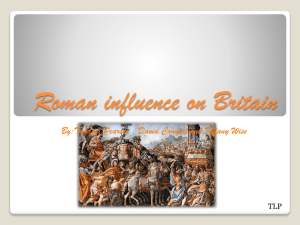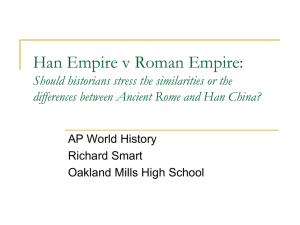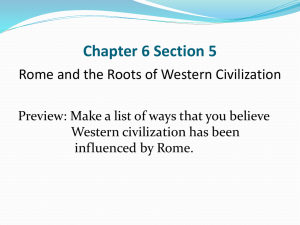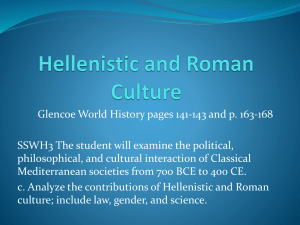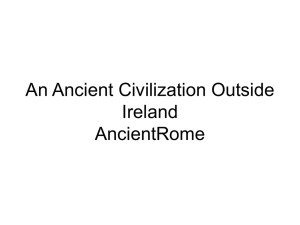THE ROMAN PERIOD IN BRITISH HISTORY
advertisement
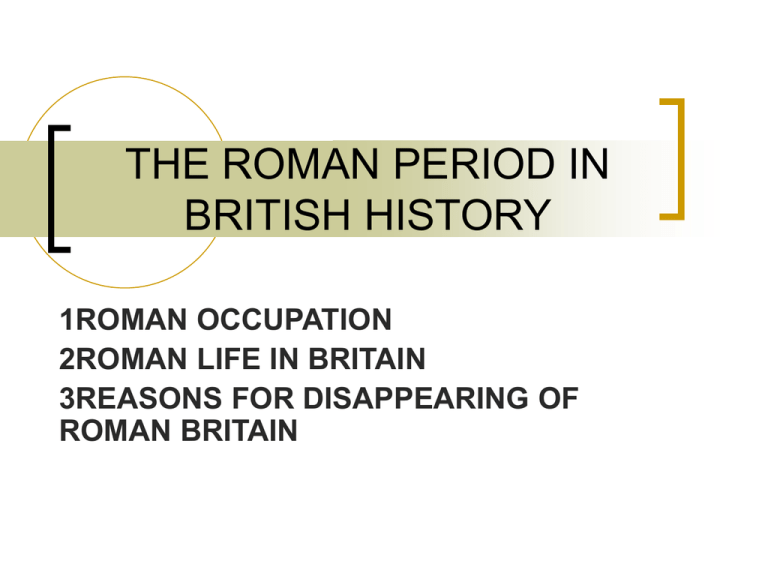
THE ROMAN PERIOD IN BRITISH HISTORY 1ROMAN OCCUPATION 2ROMAN LIFE IN BRITAIN 3REASONS FOR DISAPPEARING OF ROMAN BRITAIN ROMAN OCCUPATION - the Roman period in British history: AD 43 - AD 410 - “Britain” comes from the word “Pretani”, which is the Greco-Roman word for the inhabitants of Britain; - the word was mispronounced; - the island was called “Britannia” ROMAN OCCUPATION 1 . Julius Caesar came to Britain in 55BC 2. A Roman army occupied Britain in AD 43 (40.000 soldiers) REASONS: 1Celtic Britain was an important food producer; 2 the Romans could make use of British food for their enormous armies; 3 the Celts of Britain were supporting the Celts of Gaul who were the Roman’s enemy ROMAN OCCUPATION The Romans were determined to conquer the whole island, BUT….. a) The Romans settled only in the present day England and Wales “Cambria” b) The Romans never went to Ireland “Hibernia” c) The Romans could not conquer “Caledonia” (Scotland) and built a Hadrian’s WALL HADRIAN’S WALL THE DIVISION OF THE CELTS: 1) those who experienced the Roman rule ( the Britons in England and Wales),( the ROMANISED CELTS) 2) those who did not experience the Roman rule (the Gaels, the Picts, the Scots, the Irish in Ireland and Scotland) THE END OF ROMAN BRITAIN 1) In AD 367 the Celts of Caledonia started attacking the Roman armies; 2) In AD 409 Rome pulled its last soldiers out of Britain as the Empire began to collapse; 3) In AD 410 Rome itself fell to raiders. ROMAN LIFE IN BRITAIN: !!! LANGUAGE brought the skills of reading and writing to Britain (LATIN), BUT…. a) the Celtic peasantry remained illiterate and only Celtic –speaking; b) town-dwellers spoke Latin and Greek; c) rich landowners used Latin ROMAN TOWNS - - - - There were three different kinds of town in Roman Britain, Two kinds were established by Roman charter 1)colonia (sing) (peopled by Roman settlers) 2)municupium (sing)(the whole population was given Roman citizenship) 3) civitas (sing) (were the old Celtic tribal capitals through which the Romans administered Celtic population in the countryside) ROMAN TOWNS The Romans left: about twenty large towns ( 5000 inhabitants) one hundred smaller ones Many of these towns were at first army camps. The Latin word for camp, castra, has remained part of many town names to this day: Winchester Lancaster Leicester Reconstruction of Roman Sichester Roman Roads - All the Roman towns were connected by roads. - They were so well-built that even survived through out the long British history and became the main roads of modern Britain. - Six of these Roman roads met in London (Londinium – 20.000 people) Roman road Roman road Roman countryside The face of the countryside has changed completely There appeared a number of large farms Roman farms were called “VILLAS”. Roman Villas A Roman villa was originally a Roman country house built for the upper class during the Roman Empire. There were two kinds of villas: the villa urbana, which was a country seat that could easily be reached for a night or two, and the villa rustica, the farm-house estate permanently occupied by the servants who were in charge of the estate. Roman Villa Rustica Model REASONS FOR DISAPPEARING OF ROMAN BRITAIN: 1 The influence was largely confined to the towns. 2 In the countryside, where most people lived, farming methods had remained unchanged. 3 Celtic speech continued to be dominant in the countryside. 4 The Roman occupation had been a matter of colonial control rather than large –scale settlement.



